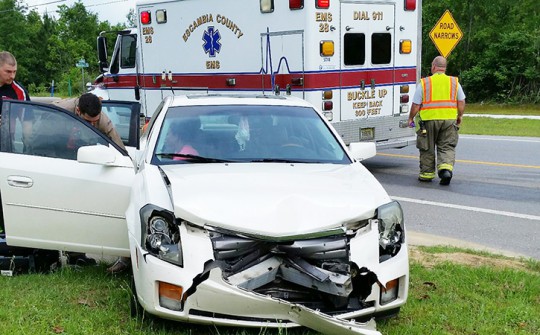PIP Insurance Repeal Proposal Re-Emerge
January 31, 2017
Florida’s no-fault auto insurance system could be nearing the end of its road.
Legislation has again been filed to eliminate personal-injury protection coverage and require motorists to carry bodily injury liability coverage.
And lawmakers were told last week that personal-injury protection reforms — championed by Gov. Rick Scott and state Chief Financial Officer Jeff Atwater in 2012 — haven’t held.
Still, Senate Banking and Insurance Chairwoman Anitere Flores said before legislation advances through her committee that could eliminate personal-injury protection coverage — also known as no-fault — she wants to know if anything else can be done to bring down rates instead of scrapping the nearly four-decade-old system.
The Miami Republican added, at the same time, that her biggest concern going forward is that the 2012 reform effort hasn’t met expectations.
“We were promised a certain percentage of savings, and that didn’t happen,” Flores said after her committee met last week.
In the first two years after Scott signed the reform law, personal-injury protection rates from the state’s top 25 insurers dropped an average of 14.4 percent — 10 percentage points lower than desired.
Since 2015, rates have gone up 25.7 percent, according to the state Office of Insurance Regulation. Meanwhile, all liability coverage has gone up 23.4 percent the past two years.
“Unfortunately, since Jan. 1, 2015 we’ve seen increasing trends across all coverages, including PIP,” said Sandra Starnes, director of property and casualty product review for the state Office of Insurance Regulation.
Starnes said the increases are due to rises in medical care, costs of vehicle body work, people driving more and even an increase in distracted drivers.
Flores’ committee is scheduled to be the first of four stops for a measure (SB 156) by Sen. Jeff Brandes, R-St. Petersburg, to replace no-fault with bodily injury liability coverage.
Rep. Bill Hager, R-Delray Beach, has filed the House version (HB 461) for the 2017 legislative session, which starts March 7.
Similar efforts have failed to advance the past couple of years as proponents have argued a need to let the reform effort take hold. But since the end of 2015, Atwater has been among those saying repeal of no-fault may be needed if consumers aren’t getting the intended relief.
Under the no-fault system, motorists are required to carry personal-injury protection coverage that includes $10,000 in medical benefits, a total set in 1979.
Dale Swope, a representative of the Florida Justice Association who is opposed to keeping no-fault, said that the benefits haven’t kept up with inflation.
The 2012 reform law, which set benchmarks for insurers to lower rates, was considered a last-ditch effort to maintain the system after rates increased due to a growth in fraudulent claims. The law also required people involved in crashes to seek treatment within 14 days and allowed up to $10,000 in benefits for emergency medical conditions, while putting a $2,500 cap on non-emergency conditions.
Ditching no-fault for bodily injury, which provides coverage if motorists cause accidents that hurt someone else, would put more questions of medical coverage into the courts, as injured parties would seek to recoup expenses from at-fault drivers, according to the state Office of Insurance Regulation.
However, not everyone is ready to eliminate no-fault.
Jeff Scott, general counsel of the Florida Medical Association, said the reform effort has weeded out fraud and ensures emergency room physicians get paid when treating automobile crash victims.
He also said lawmakers should delay any effort to eliminate no-fault until the federal government determines the future of the Affordable Care Act under the new Trump administration.
“President Trump and Congress have made it clear they intend to dismantle the ACA, but they haven’t made it clear as to what they intend to replace it with,” Scott said. “We simply do not know whether Trumpcare will increase the number of uninsured Floridians or result in a higher number of high-deductible insurance policies being sold, deductibles that poor Floridians, when faced with a large emergency room bill, are simply unable to afford.”
Michael Carlson, president Personal Insurance Federation of Florida, cautioned the repeal could result in higher premiums for all drivers depending on the mandatory premium pricing for bodily-injury coverage.
“We do believe that any consideration of the repeal of the ‘no-fault’ law should be grounded in the reality that new mandatory insurance coverages will have a price effect on Floridians,” said Carlson, whose association includes Allstate, Progressive and State Farm insurance companies.
by Jim Turner, The News Service of Florida
Comments
One Response to “PIP Insurance Repeal Proposal Re-Emerge”




This one is for the insurance companies to once again “rake it in”. Most of us take our time and work hard to avoid an accident. Insurance companies want money and lots of it. They can say hospital costs have gone up since 1979 but the truth is, so have all the insurance rates. The gimmick is to lower the rates, then double them (as in the 25.7 rate hike). Insurance companies assume 2 things. First they assume the sale at each renewal, then they assume we won’t read the bill. It is OK to change insurance companies every year and to refuse to be abused by their rate hike if we have had no involvement in any accident, ever! If they re talking about changing anything, it will always be in their favor.